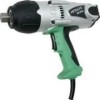Hitachi WR22SA Handling Instructions - Page 9
IMPORTANT, Correct connection of the plug, Information concerning airborne noise and vibration, - parts
 |
UPC - 717709010239
View all Hitachi WR22SA manuals
Add to My Manuals
Save this manual to your list of manuals |
Page 9 highlights
IMPORTANT Correct connection of the plug The wires of the main lead are coloured in accordance with the following code: Blue: -Neutral Brown: -Live As the colours of the wires in the main lead of this tool may not correspond with the coloured markings identifying the terminals in your plug proceed as follows: The wire coloured blue must be connected to the terminal marked with the letter N or coloured black. The wire coloured brown must be connected to the terminal marked with the letter L or coloured red. Neither core must be connected to the earth terminal. NOTE This requirement is provided according to BRITISH STANDARD 2769: 1984. Therefore, the letter code and colour code may not be applicable to other markets except The United Kingdom. Information concerning airborne noise and vibration The measured values were determined according to EN60745 and declared in accordance with ISO 4871. Measured A-weighted sound power level: 110 dB (A) Measured A-weighted sound pressure level: 99 dB (A) Uncertainty KpA: 3 dB (A). Wear hearing protection. Vibration total values (triax vector sum) determined according to EN60745. Impact tightening of fasteners of the maximum capacity of the tool: a Vibration emission value h = 23.9 m/s2 Uncertainty K = 1.8 m/s2 The declared vibration total value has been measured in accordance with a standard test method and may be used for comparing one tool with another. It may also be used in a preliminary assessment of exposure. WARNING ⅜ The vibration emission during actual use of the power tool can differ from the declared total value depending on the ways in which the tool is used. ⅜ Identify safety measures to protect the operator that are based on an estimation of exposure in the actual conditions of use (taking account of all parts of the operating cycle such as the times when the tool is switched off and when it is running idle in addition to the trigger time). English 8















